February 10, 2004
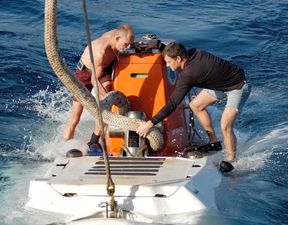
Ken Kennerson and Mark Spear unhitch Alvin from the A-frame lift line durings today's launch.
Tuesday's web update is a personal account of today's dive as told by Maurice Tivey, a geophysicist from Woods Hole Oceanographic Institution.
The dive today was the first for Yuri Rzhanov but the 26th in Alvin for me. The pilot was Pat Hickey who has had over 500 dives in Alvin!
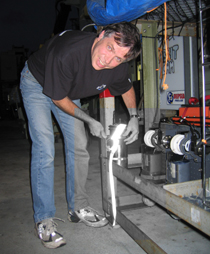
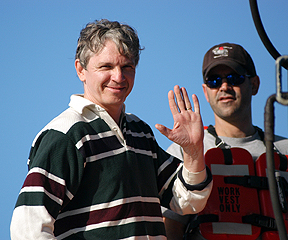
Maurice detaches a magnetic sensor from the Rabbit Cam, Yuri waves good-bye before climbing into the sphere on his frist Alvin dive as Bruce Strickrott looks on.
The day starts early at 6:00 am when I got up to download the magnetic data from the camera tow from the night before. Then at 7:00 its time for breakfast before getting ready for the launch. I had put my warm wooly sweater and socks in the sub the night before. The weather check looked good for the day so the Captain and Chief Alvin Pilot (Pat) gave the “green light” for a dive today.
The objective of today’s dive was to look at the Axial Summit Trough (AST) where most of the lava eruptions occur. We were going to look at a contrast in age between an older AST with lots of fractures and a younger AST that had apparently recently erupted.
The ALVIN was launched just before 8:00 am and we were decending pretty soon afterwards. We reached bottom at about 9:30 am and started working. First we drove the sub. around to locate ourselves on the map, finding the walls of the AST and marking them on the map. We set out some seafloor experiments for Wolfgang and Cara at the western wall of the AST and then took a rock sample.
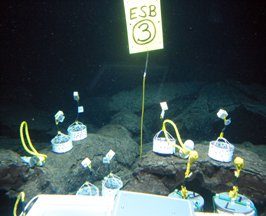 Cara and Wolfgangs 'baskets' filled with volcanic glass
as deployed on the lobate lava flow on the west rim of the AST, that they
hope will serve as a nice 'home' for deep sea slime.
Cara and Wolfgangs 'baskets' filled with volcanic glass
as deployed on the lobate lava flow on the west rim of the AST, that they
hope will serve as a nice 'home' for deep sea slime.
We motored back across the AST valley; it was mostly old fractured lava and some mud. We turned north and started looking for the younger lava flow. We came across very glassy lavas and sampled those.
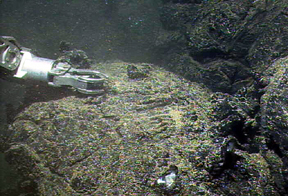 Alvin
sampling some of the glassy 'buds' on the lobate flows early in today's
dive.
Alvin
sampling some of the glassy 'buds' on the lobate flows early in today's
dive.
The flows looked like they were the young lava seen in camera and sonar surveys. Then we motored further east and came across the young AST itself. It was a magical place of lava pillars and arches with lots of collapsed ceilings to the lava.
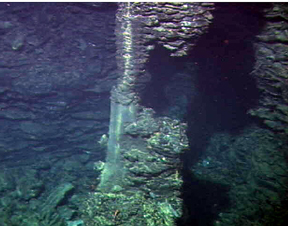
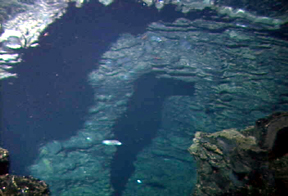 Archways
and lava pillars grace the floor of the youthful, narrow AST near 9°
43.5'N on the East Pacific Rise axis.
Archways
and lava pillars grace the floor of the youthful, narrow AST near 9°
43.5'N on the East Pacific Rise axis.
The AST was just big enough for ALVIN to go down into but with pillars seemingly everywere it was not big enough to turn around. We took some more samples then did an hour long sonar and digital photographic survey to document the area.
We finished the sonar survey and headed further east before getting to a small scarp. The scarp had blocked lava from flowing much further downslope; just like a dam.
We left the bottom at 1:45 pm after having used up all of ALVIN’s battery power. We had 8 rock samples and lots of video, digital still photos, and sonar data. We reached the surface at 3:30 pm and were back on the ship just after 4:00 pm. As we climbed out of the sub, Yuri was welcomed back with the usual first-timers bath of cold ice water.
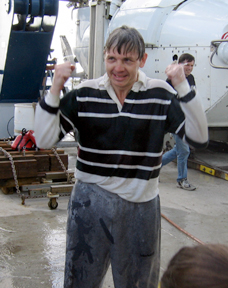 Yuri
getting his 'baptism' of icy sea water after the dive today.
Yuri
getting his 'baptism' of icy sea water after the dive today.
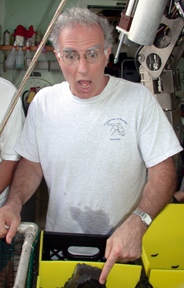
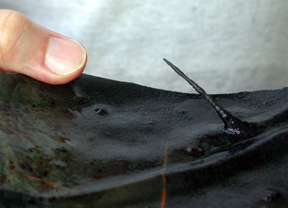 Left
photo says it all..., Dr. Perfit, also know to friends and fans as 'Magma
PI' is amazed at the rocks collected today and especially the delicate
drip structures on the undersides of the lava crusts. Right photo shows
a close up of one of the delicate drips, it is about 3 inches long.
Left
photo says it all..., Dr. Perfit, also know to friends and fans as 'Magma
PI' is amazed at the rocks collected today and especially the delicate
drip structures on the undersides of the lava crusts. Right photo shows
a close up of one of the delicate drips, it is about 3 inches long.
The samples brought back by Maurice and Yuri were much appreciated by Mike Perfit and the rest of the geologists aboard Atlantis. The close-up picture above shows the bottom of a lobate lava flow crust (the sample is upside down). The highly unusual needle-like feature is what remains of a frozen lava drip that formed under the upper crust of the flow. These delicate drips and thin ridges form in cavities filled with super-heated steam that was created when the hot lava boiled seawater as it flowed over the seafloor.

Chief Engineer, Chris Morgan, keeps watch as Alvin is launched from the Dog House.